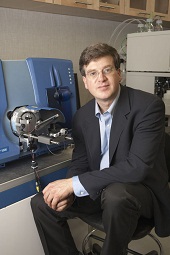Skip to content. | Skip to navigation
Personal tools

- Contact Us |
- Seminars |
- Donate

Lunenfeld-Tanenbaum Research Institute
Mount Sinai Hospital
Joseph & Wolf Lebovic Health Complex
991-3 — 600 University
Toronto, Ontario
M5G 1X5
Tel.: 416-586-4800 ext.2215
Fax: 416-586-5993
► Web of Science Researcher ID
H-6308-2011
Dr. Frederick P. Roth
SENIOR INVESTIGATOR
Dr. Frederick (Fritz) Roth is an inaugural Canada Excellence Research Chair in Integrative Biology and a Senior Investigator at the Lunenfeld-Tanenbaum Research Institute. Known worldwide for his work in computational biology and genomics, Dr. Roth is jointly appointed at the University of Toronto's Terrence Donnelly Centre for Cellular and Biomolecular Research.
Dr. Roth completed his PhD in biophysics at Harvard University in 1998, after studying both physics and molecular and cell biology at the University of California, Berkeley. His most recent position before joining the Lunenfeld was at Harvard Medical School, where he was an Associate Professor in the Department of Biological Chemistry and Molecular Pharmacology.
His research focuses on developing technologies to more efficiently relate genes to the functioning of living systems and human diseases. These new technologies will accelerate researchers' studies of genes, their functions and how these functions interact to form living systems.
Building on their previous work in experimental and computational genomics, Dr. Roth's team will collaborate with other Lunenfeld researchers in the Systems Biology group to develop new technologies for revealing gene functions, the pathways they encode and how these genes and pathways are related to human diseases. Dr. Roth's group is harnessing “next generation†DNA sequencing technologies to systematically measure the effects of multiple genetic changes, and to map protein interactions.
Large-scale experimentation on biological model systems by Dr. Roth and others in the Systems Biology group is uncovering fundamental aspects of protein, cell and organismal function to better understand human health and disease.
Early work by Dr. Roth demonstrated that DNA sequence elements controlling genes can be automatically discovered using large-scale measurements of the levels at which genes are activated.
His group has extensively studied the networks of interactions between proteins in yeast, worms, plants and humans. More recently, Dr. Roth's team has computationally prioritized candidate disease genes so that researchers can focus efforts on the genes most likely to impact human health.
At a Glance
Dr. Roth is a Canada Excellence Research Chair in Integrative Biology, a Lunenfeld Senior Investigator and is cross-appointed at the University of Toronto's Donnelly Centre for Cellular and Biomolecular Research.
His team is at the forefront of developing new technologies to accelerate researchers' studies of genes, their functions and how these functions interact to form living systems.
Dr. Roth is a leading international expert in genomics and is using large-scale, sophisticated DNA sequencing techniques to uncover and understand interactions between genes and the proteins they encode.
Studies in his group range from basic research in model organisms (e.g., studying DNA repair systems in yeast) to humans (e.g., discovering host factors important for human viruses).
By developing, integrating and applying experimental and computational technologies, Dr. Roth's team is working to understand biomolecular pathways and their relationship to human health.
Major Research Activities
With an extensive track record of innovation in experimental and computational genomics, Dr. Roth's team is developing new technologies to accelerate discoveries of gene functions, the pathways they encode and the relationships to human illnesses. A flagship project is Barcode Fusion Genetics (BFG), a sequencing-based experimental technology to measure the effects of multiple genetic changes in yeast and human cells. The BFG method is also being adapted to identify networks of protein interactions and how cancer-causing mutations in key regulatory proteins can alter these networks. His team is also developing new methods to lower the cost of DNA sequencing, and they are using computational approaches to determine the order in which genes act within genetic pathways. Through these and other projects, Dr. Roth endeavours to identify and prioritize candidate genes toward improved understanding of the causes and cures of diseases including cancer.



